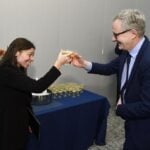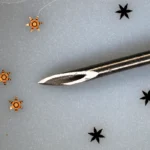Q&A with Former PS-OC Intern, Stephanie Lux
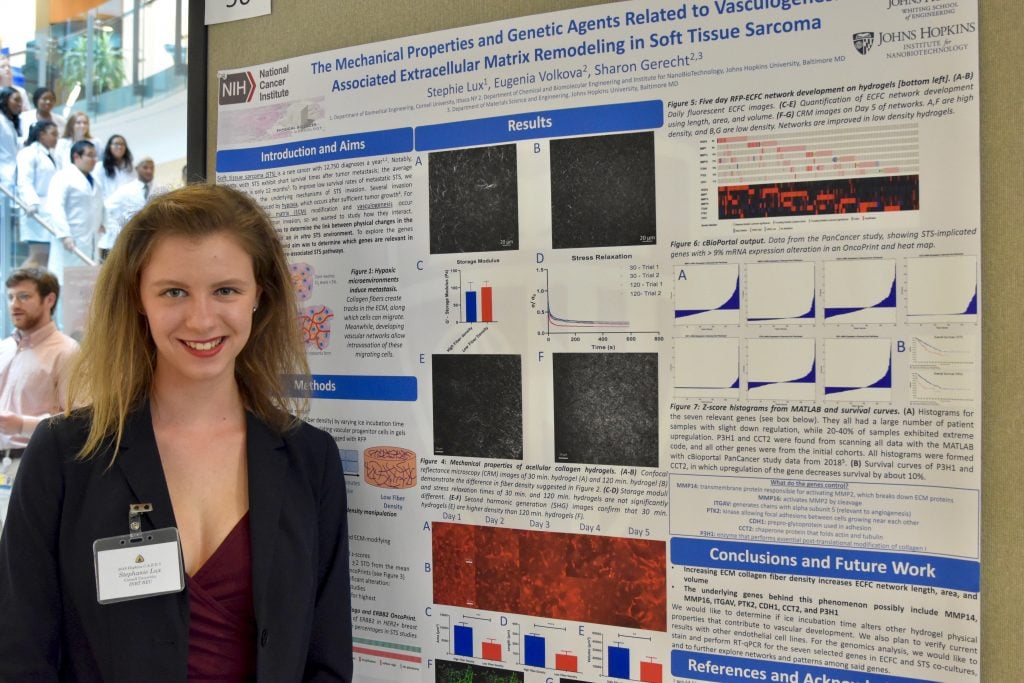
Every summer, The National Cancer Institute’s Cancer Systems Biology Consortium & Physical Science Oncology Network (PSON) hosts a summer intern at their various locations in their Summer Research Program. The program is designed specifically for rising junior and senior undergraduate students who wish to gain experience in the interdisciplinary fields of systems biology and physical oncology.
This past summer, the Physical Sciences-Oncology Center at INBT, which is a member of the PSON, hosted intern Stephanie Lux from Cornell University. Stephanie worked in the lab of Sharon Gerecht, INBT’s director, focusing on the extracellular matrix as a component to the cancer microenvironment. Meet Stephanie’s and learn how her experience helped to shape her career plans.
Tell us about yourself.
I’m currently a junior at Cornell University working towards a bachelor of science in biomedical engineering on a pre-medical track. I started working in Claudia Fischbach’s lab the summer after my freshman year, which marked my start in physical oncology research. My research with Dr. Fischbach focuses on the bone’s micro-environment and how it’s evolving properties can contribute to breast cancer metastasis.
In addition to research, I’m on the project team, Engineers for a Sustainable World. I serve on the executive board and work with my sub-team to design sustainable solutions for local organizations. I’m also employed as an Engineering Learning Initiatives Tutor, where I tutor students in core engineering classes.
Outside of academia, I have danced all my life, and continue dancing and choreographing with Rise Dance Group. I also enjoy traveling. I had the privilege of living overseas and learn different languages, including German, while growing up. Finally, I am an avid baker and I love spending time with my family, friends, and dog.
Why did you choose to apply for the PSON summer internship?
I first heard about the internship through Claudia Fischbach. When I first read the internship’s description, it sounded like the perfect opportunity to further my professional goals. Before joining Dr. Fischbach’s lab, I was interested in several avenues of biomedical research, but cancer research stuck out to me since I’ve had several family members with cancer. After starting in her lab, I realized just how complex cancer is and I became intrigued by it academically, as well as personally.
I wanted to learn about more aspects of cancer since I primary looked at the pre-metastatic niche. I was fascinated by the project at Hopkins and felt that it could give me a unique and interesting view of cancer. I was also excited by the opportunity to attend a conference at the National Cancer Institute, and to work in another lab. I knew right away that I had to apply for the PSON internship.
Tell us about the project and research you worked on this past summer.
I examined the link between vasculogenesis (i.e. the formation of blood vessel networks from precursor cells) and the remodeling of the extracellular matrix (the protein-rich substance surrounding all of our cells) in a rare line of cancer known as soft tissue sarcoma. The extracellular matrix is known to be physically altered in the presence of a tumor, and simultaneously, a growing tumor induces vasculogenesis so it can obtain oxygen and nutrients from the blood. We were curious if these two phenomena were not only related to tumor development, but also to each other.
My project explored this in two different ways. First, we explored how the mechanical properties of the extracellular matrix change in the presence of cells capable of undergoing vasculogenesis. We used two, 3D in vitro models to achieve this — one that mimicked a healthy extracellular matrix, and one that mimicked an extracellular matrix of someone with cancer. Secondly, we performed a coding analysis of cancer genomics data in an attempt to find which genes might be responsible for both the changes in vasculogenesis and the changes in the extracellular matrix.
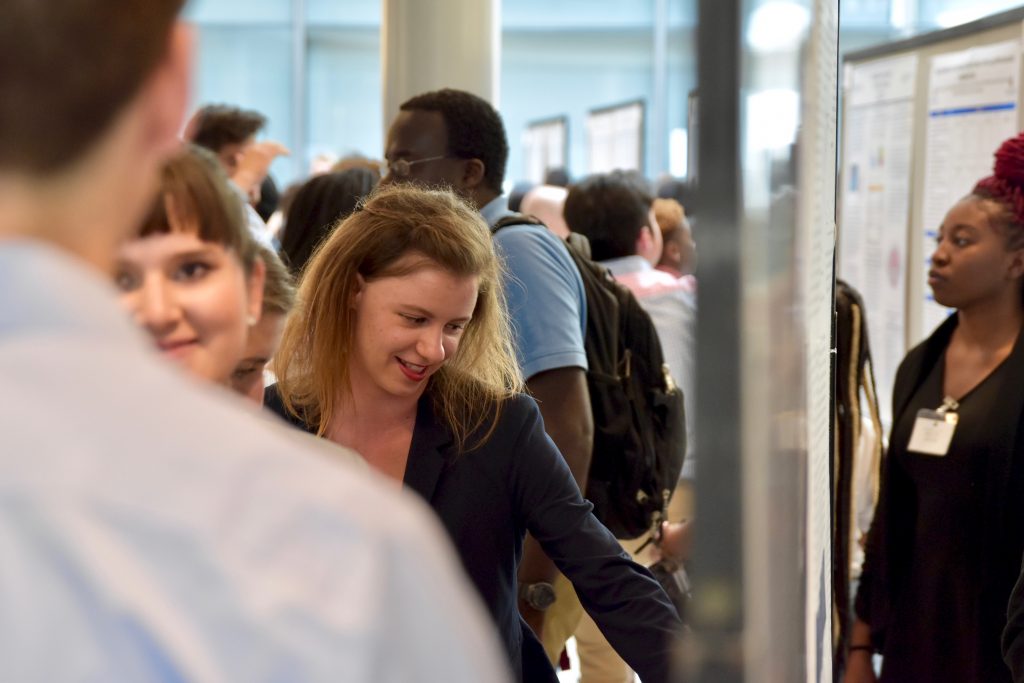
Besides performing research, what else did you do during the internship?
I presented my work numerous times at Hopkins and at my program’s conference in Bethesda. I presented my work orally for the INBT REU interns at Hopkins, and did poster presentations at the Hopkins CARES Symposium and the PS-OC conference. I also attended my host lab’s weekly meetings and journal clubs, and completed a class on statistics in R for large data sets taught through the internship.
Since I plan to pursue a career in medicine, I learned more about the Hopkins Medical School and MD/PhD program. While at the medical school, I observed mouse surgeries. While it was not part of my project, it was fascinating. My graduate student mentor and I also collaborated with the histology core research group at the medical campus. Finally, being in Baltimore gave me the chance to travel around the Washington, DC area and Pennsylvania!
What types of opportunities did the PS-OC program provide you that you otherwise would not have received?
The program provided numerous unique opportunities. Traveling to Bethesda to present my work at the National Institute of Health (NIH) was a great opportunity. I really enjoyed sharing my work with the other interns in my program, who I only got to meet at the conference since we were all at different sites, and I loved hearing about their work and seeing how it connected to mine. The conference also provided networking opportunities and to hear from top PS-OC researchers, leaders at the NIH, and patient advocates.
Additionally, my program included biweekly conference calls with a class where we learned about breast cancer metastasis and statistics in R. The class proved valuable during my time at Hopkins with the genomics portion of my project, and I think it will also help me with my course and lab work at Cornell.
Tell us about the types of relationships you developed while interning. How was your relationship with your mentors?
I developed several strong relationships with my mentors and the other researchers during my time at Hopkins. I worked mostly with one graduate student, Eugenia Volkova. Eugenia was a very well-matched mentor for me since we had similar personalities and working styles. I learned a lot from Eugenia, including new research techniques, how to present my work better, what I can do to achieve my career goals, and the best things to do in the Baltimore area. Eugenia also pushed me to independently search for new project directions, which really helped me feel like a major contributor to the lab’s work. I always felt very encouraged yet challenged while working with Eugenia, and I consider her my friend as well as my mentor.
I also received help from Dr. Hawley Pruitt, who has worked on similar projects to mine in the past. She was able to give me a lot of helpful advice, particularly on my genomics project. My PI, Dr. Sharon Gerecht, was also quite helpful. She shared her career path with me and offered me advice. She also encouraged and guided my project, especially right before the poster presentations. Lastly, I really enjoyed working with Eugenia’s other undergraduate and high school students, especially Linda Procell. I worked quite a bit with Linda on her MATLAB project since I had some applicable experience, and I really loved sharing our different background knowledge to help make the project a success.
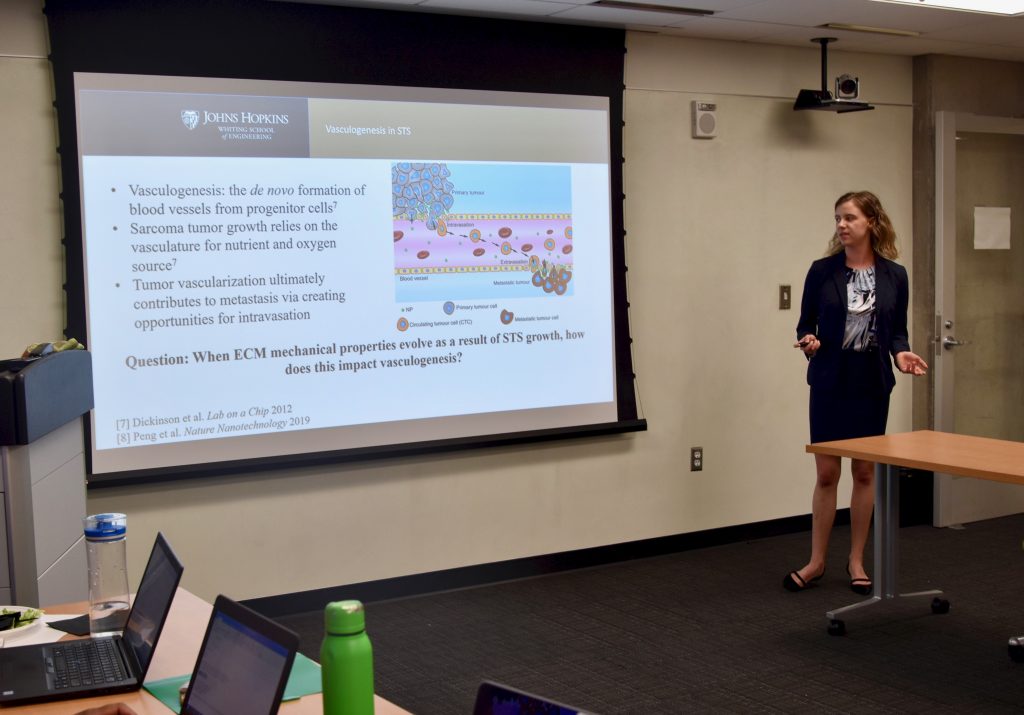
Now that the internship is over, has it changed your career plans?
The internship has actually solidified and refined my career plans. I entered the program intending to pursue an MD/PhD after finishing my undergraduate degree, and after this summer, I feel more confident in the choice to pursue the path of a physician-scientist. Prior to this summer, I knew abstractly that I wanted to enter medicine and continue biomedical engineering research, but I wasn’t certain about what type of doctor I want to be. I had considered surgery and neuroscience for some time, but continued work in a physical sciences of oncology lab has made me see that oncology is a very natural choice for me.
This summer, I delved deeper into a type of cancer I hadn’t learned much about from an angle I hadn’t studied before. This piqued my interest further and I now want to learn as much as I can about cancer. I am deeply fascinated by cancer research and excited by the opportunity to make a life-saving discovery. Beyond that, I also want to directly share those discoveries and provide them to patients myself, which is why I realized oncology itself would be an ideal career for me. Becoming a physician-scientist in oncology is the perfect opportunity to combine my curiosity for cancer with my passion to help patients.

